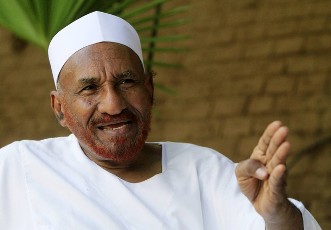Sudan: NUP leader under fire over conciliatory stance on regime
April 1, 2012 (KHARTOUM) – Al-Sadiq al-Mahdi, leader of Sudan’s opposition National Umma Party (NUP), has been castigated over alleged mismanagement of interparty politics as well as his ambiguous position towards the government.

Unlike the Democratic Unionist Party (DUP) of Mohamed Osman al-Mirghani, which joined the NCP’s government last year, the NUP has refused to join and declared adoption of “civil Jihad” to achieve change.
But Al-Mahdi has also sought to distance the NUP from the camp of its anti-government allies in the National Consensus Forces (NCF), often criticising their agenda and warning against the repercussions of chaotic regime change.
Following his refusal to join the government, Al-Mahdi reportedly promised President Al-Bashir last year to lead a “responsible opposition”
It is becoming clear, however, that many within the NUP do not agree with Al-Mahdi’s positions.
A group of NUP dissidents known as the “General Current” held a press conference in the capital Khartoum on Sunday and launched a barrage of criticism against Al-Mahdi’s leadership.
Khalil Hamouda, head of the General Current’s politburo, said that Al-Mahdi bears responsibility for the deteriorating situation of the party.
The group’s members, who walked away from the NUP in the wake of the party’s seventh general-congress in 2009, also declared their intention to boycott meetings of the NUP’s central committee, scheduled for 6 and 7 April.
According to the group’s member Yahia Mohammed Satti, the NUP’s problem lies in the personality of Al-Sadiq al-Mahdi.
Satti accused Al-Mahdi of engaging in “political deception”, citing the fact that his daughters are actively involved in the opposition whereas his sons have joined the government.
Al-Mahdi’s son Abdul Rahman was appointed last year as an assistant to President Omer Al-Bashir, a move Al-Mahdi sought to defend by saying his son is no longer affiliated to the NUP.
More, and perhaps unexpected criticism of Al-Mahdi, came from his deputy Mubarak Al-Fadil, who disbanded his breakaway group, the Umma Reform and Renewal Party (URRP) and rejoined the NUP in January 2011.
Al-Fadil described as “foggy” Al-Mahdi’s position on the merger between the NUP and the URRP, revealing that 15 months of negotiations on integrating URRP’s members into the NUP have failed to yield results.
He further disclosed that Al-Mahdi’s conciliatory position towards the regime had widened the gap, saying that he advised Al-Mahdi on the necessity of extricating the NUP from his own views.
Al-Fadil also faulted Al-Mahdi for what he described as the “unacceptable” defense of his son’s participation in the government.
He went on to accuse Al-Mahdi of offering his son as a “token of friendship” to the government.
(ST)
